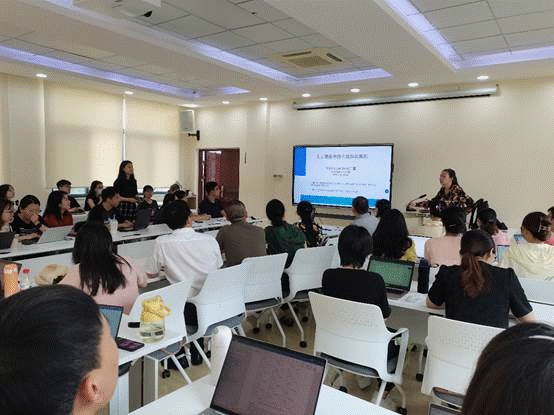At the invitation of the Center for Studies of Information Resources, Wuhan University, and our School, Marcia Zeng, Professor at the School of Information, Kent State University, came to our School to have a discussion meeting with teachers and students on the afternoon of June 19.
Professor Gang Li, Professor Rongying Zhao, Professor Quan Lu, Professor Congjing Ran, Professor Yiming Zhao and some student representatives attended the meeting. Professor Lu An presided over the meeting.

Marcia Zeng gave an academic report entitled Active Knowledge Organization in Artificial Intelligence. The report included two parts: the first part was to explore the focus of this discussion via several images and explain the importance of knowledge organization system (KOS) and ontology knowledge library to machine learning; The second was to explain three cases to show the role of knowledge organization and embrace the trend of artificial intelligence (AI).
Marcia Zeng started from the statement of International Federation of Library Associations and Institutions (IFLA) about library’s artificial intelligence and the data-information-knowledge-wisdom (DIKW) pyramid, and showed the significance of contextual information and records through the case of Hot Dog and charger, and explained the importance of knowledge organization system. She pointed out that with the development of artificial intelligence technology, some artificial intelligence and machine learning applications could introduce new services and functions to libraries. Similarly, artificial intelligence and machine learning could add new dimensions and methods to the library's knowledge management process, especially organization, storage and integration of knowledge.
By explaining the types of knowledge organization system, she led to the focus of this report--ontology knowledge library, and introduced two tools, Cogito Intelligence API and Permion. Ontology is a kind of knowledge library, which can tell users what they can and cannot have. Cogito Intelligence API can bring semantic processing function to applications or analysis channels, analyze documents, web pages, tweets and any large data sets, so that customers, such as government, intelligence, law enforcement agencies and enterprise security, can access and utilize some of the most strategic information sources. Permion uses precise logic for reasoning, uses conceptual diagram to represent natural language, and mathematical methods of probability and statistics.
On this basis, Marcia Zeng showed three cases, namely the 20th Century Press Archives (PM20), Online Coin of Roman Empire (OCRE) and SAMPO Model in Finland, to encourage students to explore ontology knowledge library deeply. She pointed out that in order to make the digitized archive library more effective, we should know how to reveal the unknown and understand the characteristics of metadata and knowledge organization system (KOS) in information processing. OCRE is the representative of intelligent data, which can not only be used for browsing, but also provide visual query and quantitative analysis research results directly. Works of SAMPO shows the shift of focus in the research of three generations of digital humanistic semantic portals, towards knowledge discovery and artificial intelligence.

After Marcia Zeng's report, the teachers and students had active and in-depth exchanges and discussions, and the atmosphere was warm. The cases explained by Marcia Zeng were rich, interesting and fascinating, which aroused new thoughts of teachers and students in artificial intelligence, knowledge organization and ontology knowledge library, and achieved good communication results.